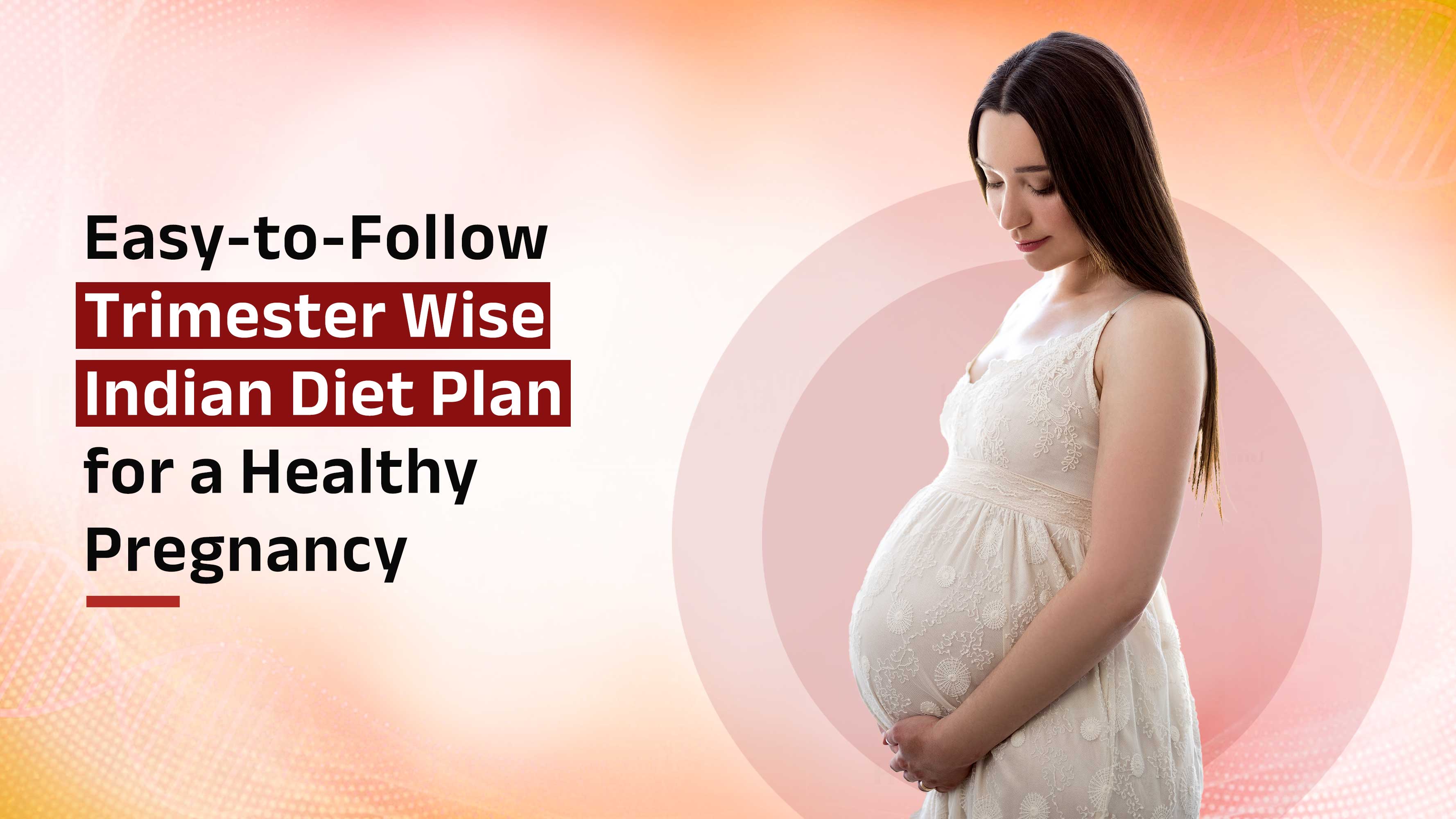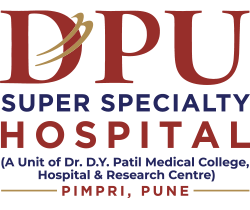Trimester-wise Indian Diet Plan for a Healthy Pregnancy

Indian Diet Plan in Pregnancy
A healthy diet during pregnancy is essential for the well-being of both the mother and the developing baby. Traditional foods and practices are often followed during pregnancy to provide the necessary nutrients and support for a healthy pregnancy. A well-balanced Indian diet during pregnancy should include a variety of foods from different food groups, such as grains, pulses, vegetables, fruits, dairy, and healthy fats.
PCOD stands for Polycystic Ovarian Disease, a condition that affects the ovaries in women. In PCOD, the ovaries contain many small cysts or follicles that do not mature and release eggs as they would during a menstrual cycle. It is a hormonal disorder that can cause several symptoms, including irregular periods, acne, weight gain, excess hair growth, and fertility problems. The exact cause of PCOD is not fully understood. But it is believed to be related to an imbalance of hormones, particularly an excess of androgen hormones (such as testosterone) and insulin resistance.
Pregnant women need to consume enough calories and nutrients to support the growth and development of the baby. And also maintain their health[1]. Additionally, certain foods and practices are considered beneficial during pregnancy, such as consuming ghee (clarified butter) for its high nutritional value, drinking milk for calcium, and eating certain herbs and spices for their medicinal properties. Working with a healthcare provider or registered dietician can help ensure that the diet plan during pregnancy gets tailored to the individual's needs and goals.
Importance Of A Healthy Diet During Pregnancy
A healthy diet[2] during pregnancy should include a variety of foods from different food groups, such as fruits, vegetables, whole grains, lean proteins, dairy, and healthy fats. It is also vital to avoid certain harmful foods and substances during pregnancy, such as alcohol, caffeine, and certain types of fish. A healthy diet during pregnancy is essential for several reasons, including:
- Providing the necessary nutrients for the growth and development of the baby
- Reducing the risk of complications during pregnancy and childbirth
- Supporting the mother's overall health and well-being during and after pregnancy
- Reducing the risk of certain pregnancy-related conditions, such as gestational diabetes and preeclampsia
- Improving the chances of healthy birth weight for the baby
- Supporting breastfeeding and the nutritional needs of the baby after birth
Essential Nutrients to Include in Your Pregnancy Diet
It is important to note that the nutrients needed during pregnancy may vary based on individual needs and factors such as age, weight, and overall health. However, during pregnancy, it is vital to consume a well-balanced diet[2] that includes a variety of nutrients. Some essential nutrients to have in a pregnancy diet are:
- Folic acid: needed for fetal development and reducing the risk of defects
- Iron: required for the production of hemoglobin, which carries oxygen to the baby
- Protein: necessary for the growth and development of fetal tissues and organs
- Omega-3 fatty acids: critical for brain and eye development
- Vitamin D: vital for the absorption of calcium and bone health
- Vitamin B6: necessary for the development of the baby's nervous system
- Zinc: essential for fetal growth and development, as well as immune system function
Indian Diet Chart and Meal Plan for Pregnancy Trimester Wise
A well-balanced and nutritious diet is necessary for a healthy pregnancy. A diet chart and meal plan can be a great way to ensure that pregnant women consume the required nutrients for themselves and their developing babies. A trimester-wise meal plan can be helpful, as nutrient needs may change throughout pregnancy.
During the first trimester, it is crucial to focus on consuming nutrient-dense foods that can help support the growth and development of the fetus. It includes foods high in folic acid, iron, calcium, and protein. As the pregnancy progresses into the second and third trimesters, the nutrient needs may change, necessitating a caloric intake increase and consuming more nutrient-dense foods to support fetal growth.
Note: During pregnancy, speak with a healthcare professional or a registered dietitian to develop a custom diet plan based on your unique needs and objectives. The food you consume may also change depending on your activity level, pre-pregnancy weight, and other personal factors.
1. First Trimester (Week 1 - 12)
You can follow the below-mentioned diet for the first trimester of your pregnancy.
| Meal Time | Foods to Include |
|---|---|
| Breakfast | 2 whole wheat bread slices + 1 boiled egg + 1 cup milk |
| Mid-Morning Snack | 1 banana + a handful of nuts |
| Lunch | 1 bowl of brown rice + 1 bowl of vegetable curry |
| Evening Snack | 1 apple + 1 glass of fresh orange juice |
| Dinner | 1 bowl of lentil soup + 2 whole wheat chapatis |
| Bedtime Snack | 1 cup warm milk with a pinch of turmeric |
2. Second Trimester (Week 13 - 27)
You can follow the below-mentioned diet for the second trimester of your pregnancy.
| Meal Time | Foods to Include |
|---|---|
| Breakfast | 2 whole wheat bread slices + 1 boiled egg + 1 cup milk |
| Mid-Morning Snack | 1 apple + a handful of nuts |
| Lunch | 1 bowl of pulao + 1 bowl of cooked veggies |
| Evening Snack | 1 banana + 1 glass of fresh juice |
| Dinner | 1 bowl of veggie soup + 2 whole wheat chapatis |
| Bedtime Snack | 1 cup warm milk with a pinch of turmeric |
3. Third Trimester (Week 28 - 40)
You can follow the below-mentioned diet for the third trimester of your pregnancy.
| Meal Time | Foods to Include |
|---|---|
| Breakfast | 2 whole wheat bread slices + 1 scrambled eggs + 1 cup milk |
| Mid-Morning Snack | 1 fruit (any) + a handful of nuts |
| Lunch | 1 bowl of vegetable pulao + 1 bowl of dal |
| Evening Snack | 1 fruit + 1 glass of fresh juice |
| Dinner | 1 bowl of veggie soup + 2 whole wheat chapatis |
| Bedtime Snack | 1 cup warm milk with a pinch of turmeric |
Nutritious Foods to Include for a Healthy Pregnancy
A healthy pregnancy diet should include a variety of nutritious foods[2] from different food groups to provide the necessary nutrients for the mother and the growing baby. Some nutritious foods to include in a pregnancy diet include:
- Fruits and vegetables: provide vital vitamins, minerals, and fiber. Dark leafy greens, citrus fruits, and berries are especially beneficial.
- Whole grains: provide fiber, B vitamins, and other essential nutrients. Examples include brown rice, quinoa, oats, and whole wheat bread.
- Lean proteins: are crucial for the growth and development of fetal tissues and organs. Examples include lean meats, poultry, fish, beans, lentils, tofu, and nuts.
- Dairy products: provide calcium, vitamin D, and other vital nutrients. Low-fat or non-fat milk, yogurt, and cheese are good options.
- Healthy fats: are essential for fetal brain and eye development. Examples include avocados, nuts, seeds, and fatty fish like salmon.
- Iron-rich foods: are necessary for hemoglobin production, which carries oxygen to the baby. Examples include lean red meat, poultry, fish, beans, lentils, and dark leafy greens.
- Folic acid-rich foods: are necessary for fetal development and reducing the risk of defects. Examples include dark leafy greens, citrus fruits, beans, and fortified cereals.
Foods to Avoid for a Healthy Pregnancy
One should not consume some foods during pregnancy[4] or limited to reduce the risk of foodborne illness or other complications. Some foods to avoid or limit during pregnancy include:
- Raw or undercooked meat and poultry: can be contaminated with harmful bacteria such as salmonella and E. coli.
- Raw or undercooked eggs: can be contaminated with salmonella.
- Certain types of fish: high levels of mercury in some fish can deem harmful to fetal development.
- Unpasteurized dairy products: can be contaminated with harmful bacteria such as listeria.
- Processed or deli meats: can be contaminated with harmful bacteria such as listeria.
- Caffeine: should be limited to 200 milligrams per day, as high caffeine intake can cause an increased risk of miscarriage and low birth weight.
- Alcohol: should be avoided during pregnancy, as it can cause defects, intellectual disability, and other problems.
Tips for a Healthy Indian Pregnancy Diet
Maintaining a healthy and balanced diet[3] during pregnancy is vital for the health of both the mother and the developing baby. Here are some tips for a healthy Indian pregnancy diet:
- Incorporate a variety of colorful fruits and vegetables into your diet.
- Choose whole grains over refined grains, such as brown rice over white rice.
- Include a variety of protein sources, such as lean meats, fish, poultry, eggs, beans, and lentils.
- Choose low-fat or non-fat dairy products to meet your calcium needs.
- Snack on nuts, seeds, and dried fruits instead of sugary or high-fat snacks.
- Stay hydrated by drinking plenty of water and other fluids, such as coconut water and fresh fruit juice.
- Cook with healthy oils, such as olive and coconut oil, instead of saturated or trans fats.
- Limit your intake of processed and packaged foods as they are high in salt, sugar, and unhealthy fats.
- Consult with a healthcare provider or registered dietician to ensure your diet meets your nutritional needs[3].
FAQs Indian Diet Plan In Pregnancy
An Indian diet plan can be wholesome for the health of the mother and the baby. However, a few questions might crop up in one's mind, and here are the answers to some of the most commonly asked ones.
Q1. Can I continue to drink tea or coffee during pregnancy?
Although not strictly forbidden, you can consume coffee and tea in moderation during pregnancy. No matter the source, women should not consume more than 300 mg of caffeine daily. For instance, avoid drinking tea or coffee during or right after meals.
Q2. Is it safe to eat street food during pregnancy?
On its own, street food is safe to eat while pregnant. The risk stems from the potential for contracting an infection or stomach bug due to sloppy food handling and contaminated water. Your immune system adapts during pregnancy so that its primary function is to defend your unborn child.
Q3. Should I take any supplements during pregnancy?
During pregnancy, take a prenatal vitamin every day. You should take prenatal vitamins before conception if you intend to become pregnant. Vitamins, minerals, and other nutrients get used by your body to stay strong and healthy. Your growing unborn child receives all the nutrients it needs from you during pregnancy. However, wait to use supplements until you've talked to your doctor.
Q4. Can I eat spicy foods during pregnancy?
Yes, if you consume spicy food during pregnancy, it is safe for both you and your unborn child. They don't appear on the lengthy list of foods to avoid while expecting. However, before making any dietary changes during pregnancy, consult your doctor.
Q5. Can I indulge in desserts or sweets during pregnancy?
You can consume sweets and desserts during pregnancy. However, check with your doctor first to ensure you are aware of any allergies that might affect your health and the health of your unborn child.
Q6. What should I do if I have food cravings during pregnancy?
Eat healthy food regularly every couple of hours to prevent cravings and keep yourself hydrated. Consuming fibrous foods can help with the cravings and maintain your overall health.
Summary
An Indian diet plan for a healthy pregnancy should include a variety of colorful fruits and vegetables, whole grains, lean protein sources, low-fat dairy products, nuts and seeds, and healthy fats. Limit processed and packaged foods and stay hydrated by drinking plenty of water and other fluids. Consulting with a healthcare provider or registered dietician can ensure that a pregnancy diet meets individual nutritional needs. In addition to a healthy diet, regular exercise, adequate sleep, and stress management are also essential for a healthy pregnancy.
Experience The Best Maternity Services At DPU Hospital
Our expert team is skilled in addressing your pregnancy-related needs, and we at DPU Hospital pride ourselves on providing expert maternity care. To learn more about maternity care at DPU Hospital, request an appointment with the doctor today.








